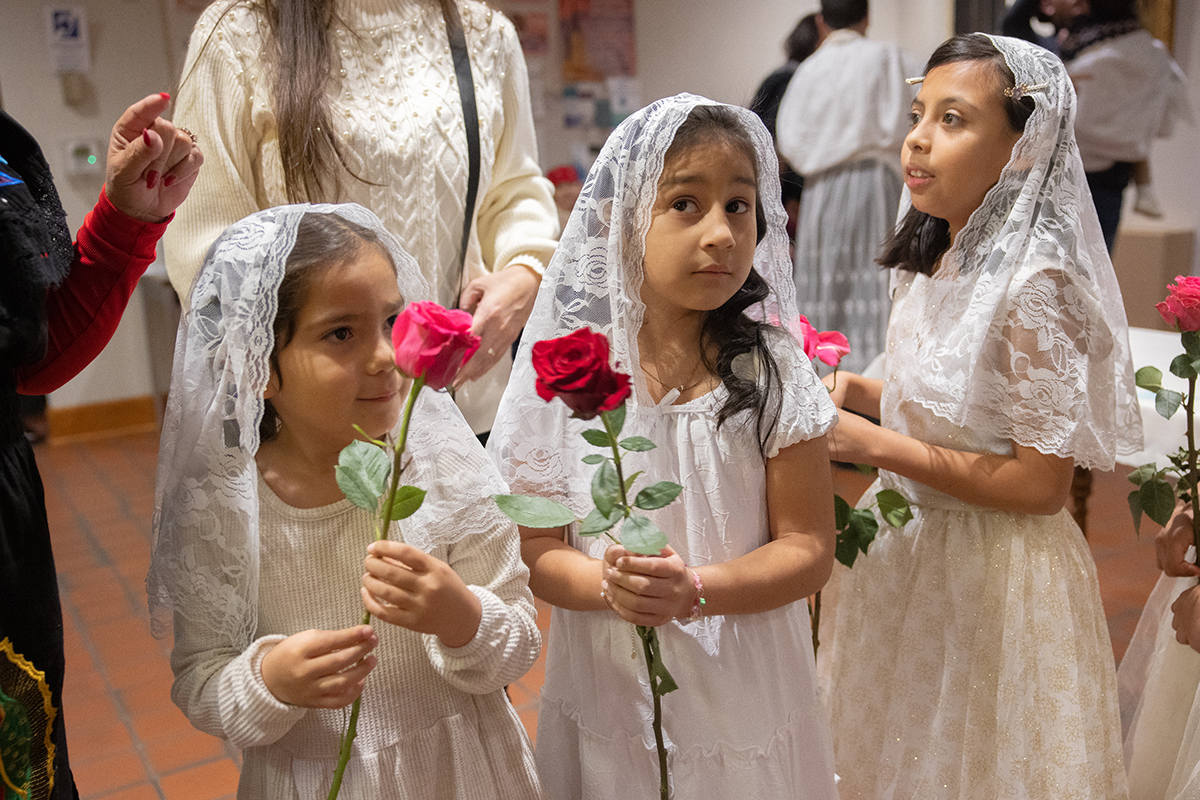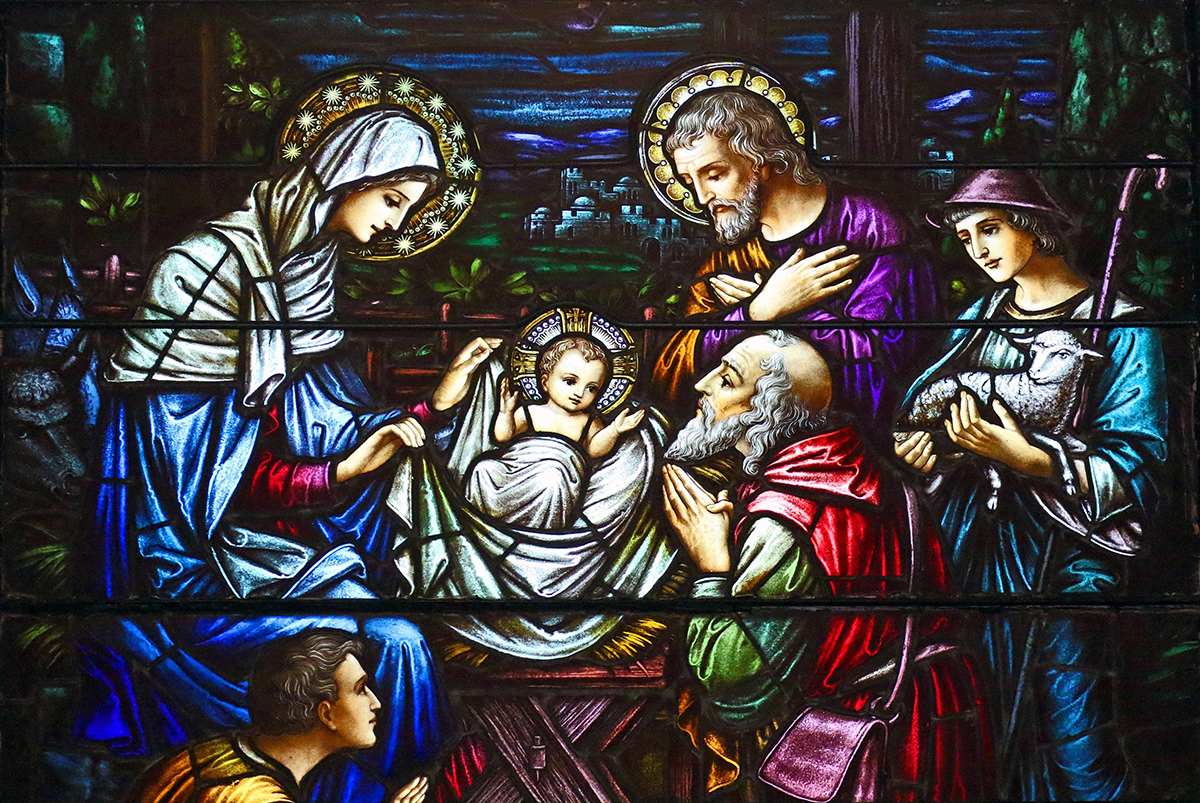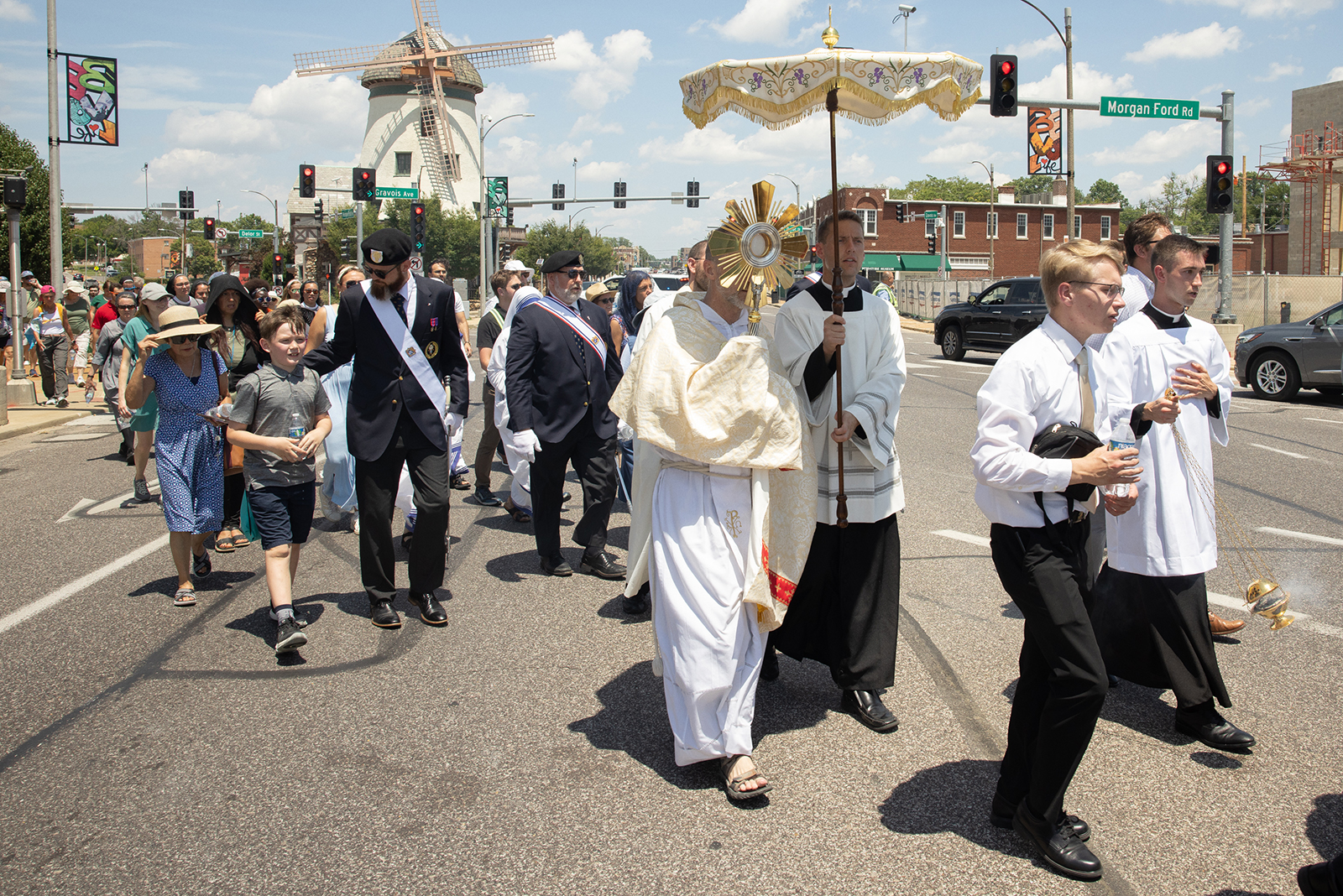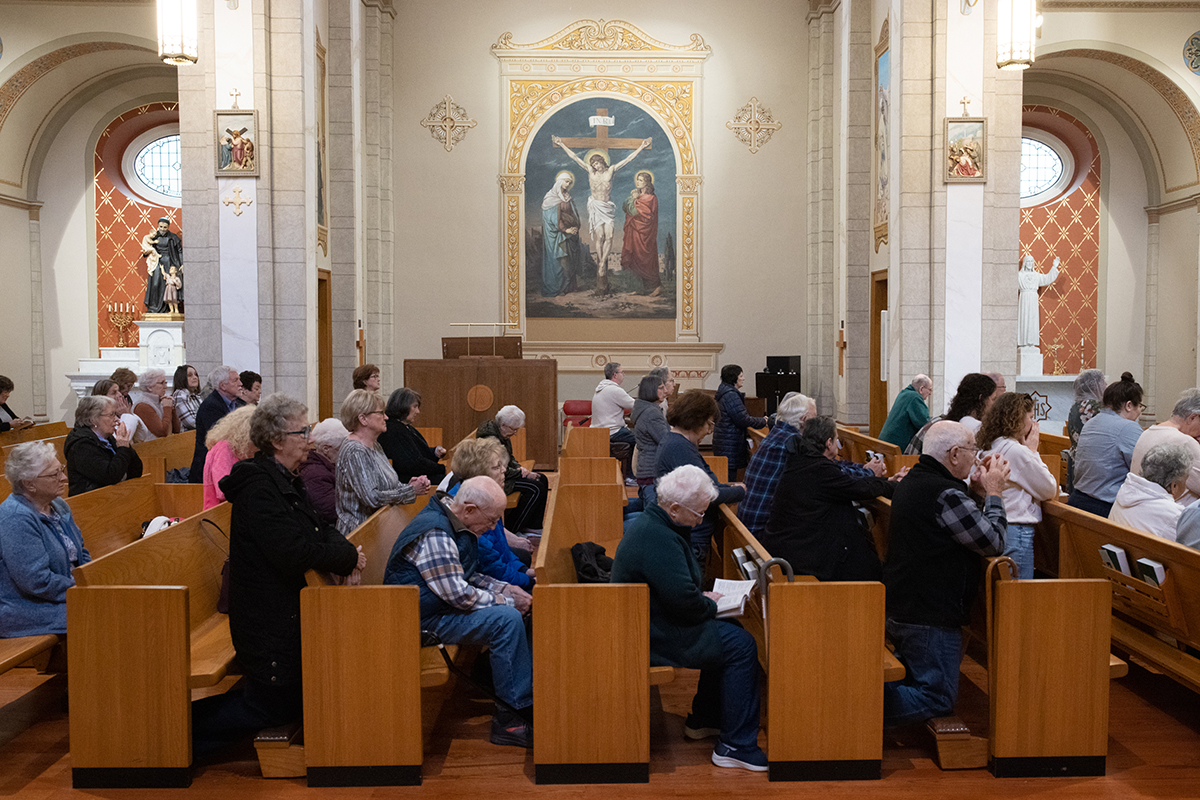Witnesses to the inherent dignity of all
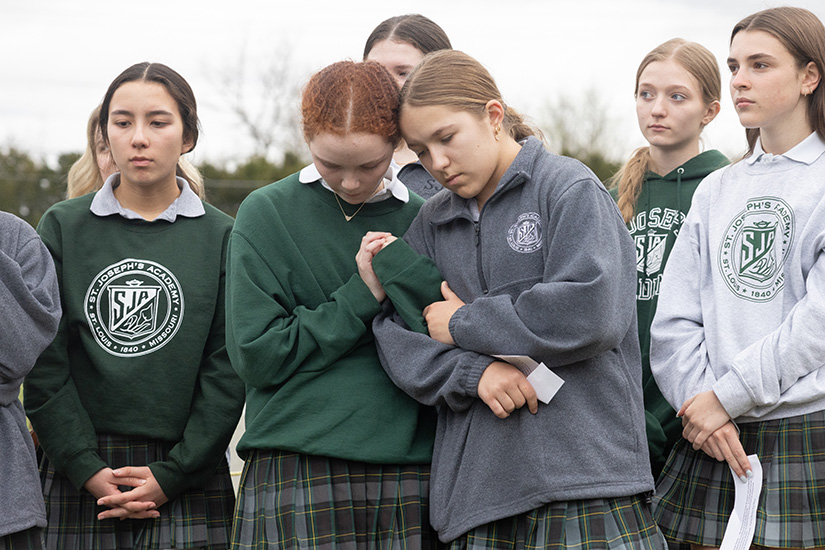
Parishioners, students join prayer vigil during Missouri’s first execution of the year
As the state of Missouri executed Brian Dorsey on the evening of April 9, high school students and parishioners from the Archdiocese of St. Louis joined a peaceful prayer vigil outside the Eastern Reception, Diagnostic and Correctional Center in Bonne Terre.
Dorsey was convicted of first-degree murder for the 2006 killings of his cousin, Sarah Bonnie, and her husband, Ben Bonnie.
During the vigil, several people read statements from Dorsey’s family, friends, fellow inmates and former corrections officers, recounting their positive relationships with Dorsey over the years. Spiritual leaders offered prayers for Dorsey, the Bonnie family, Dorsey’s lawyers, the corrections officers and everyone affected by the execution happening inside.
A smaller crowd of death penalty supporters was also present outside the prison, holding signs with a photo of Sarah and Ben Bonnie.
At 6:13 p.m., a corrections officer let the crowd know that Dorsey had died at 6:11 p.m.
Father Gerry Kleba, a retired priest of the archdiocese who served as spiritual advisor to Johnny Johnson during his Aug. 1 execution, was among those offering prayers. “We come here in this sad and difficult and grieving time, grieving for Brian Dorsey and grieving for all the people he hurt and all the family members who still suffer because of that,” he said, turning briefly to the group of death penalty supporters to his left.
“We are also here grieving for a system that acts like an eye for an eye and a tooth for a tooth is the way we want to go. And that’s not God’s way to go,” he continued. “So we pray that, first of all, the peace of eternal glory be embraced by Brian as he sees God face-to-face. And that that peace might saturate all of our lives and trickle through us — maybe even through our tears — to make a new society, more God-like, the one we want to embrace and to model for future generations.”
The death penalty opponents solemnly ended their vigil by singing “Song of Farewell,” a hymn often used in Catholic funerals.
In Dorsey’s final written statement, he apologized to the victims’ families. “To all of the family and loved ones I share with Sarah and to all of the surviving family and loved ones of Ben, I am truly, deeply overwhelmingly sorry. Words cannot hold the just weight of my guilt and shame. I still love you. I never wanted to hurt anyone. I am sorry I hurt them and you. To my family, friends, and all of those that tried to prevent this, I love you! I am grateful for you. I have peace in my heart, in large part because of you and I thank you. To all those on ALL sides of this sentence, I carry no ill will or anger, only acceptance and understanding,” he wrote.
Father Mike Lydon, episcopal vicar for the Southern Vicariate, was a first-time participant in the vigil outside the prison. “It’s a life issue, so I thought it would be very appropriate, especially as episcopal vicar in this area, to bring people here and that we support the movement of abolishing the death penalty, the state taking life,” he said. “I know it’s very different from abortion in many ways, but it’s also similar in the sense that you’re actually taking a person’s life intentionally, in the name of the people of Missouri.”

On the bus ride to and from the Bonne Terre prison, Aquinas Institute of Theology graduate students Emma Grace Johnson and Grant Hartley led a discussion on the Church’s teaching on the death penalty with the approximately 20 high schoolers in attendance. They also shared the background of Dorsey’s case, including his initial representation by a flat-fee attorney who did little investigation and advised him to plead guilty with the possibility of the death penalty still on the table.
They shared words from the former warden of Potosi Correctional Center and more than 70 current and former corrections officers who supported clemency for Dorsey, citing his perfect discipline record and their views that Dorsey had been fully rehabilitated. However, Johnson and Hartley emphasized Catholic teaching that the death penalty is inadmissible is not based on the behavior of the inmate; it reflects the inherent dignity of each person, made in the image and likeness of God.
“The dignity and value of human life is an unmerited gift of God,” Johnson said. “Unmerited means you can’t earn it; you can’t lose it.”
Three students from Nerinx Hall participated in the vigil, accompanied by director of service learning Becky Giunta. Nerinx junior Analucia Romero read a prayer from Sister Helen Prejean, author of “Dead Man Walking” and a well-known advocate for the abolition of the death penalty.
“I definitely feel like the Holy Spirit is here,” Analucia said afterward. “I think it’s beautiful how we’re all able to gather here, people from different experiences, different faiths. We’re all here for mercy, forgiveness, because we believe this is a worthy cause.”
Fellow junior Lucy Banks said she and her classmates have been studying Catholic Social Teaching in morality class. “It’s been nice to experience it in a way where I can fully understand it; I’m not just getting taught in the classroom, I can understand how I need to stand up for this,” she said.
Sophia Stage said what she learned about the death penalty in Missouri through the discussions on the bus will stick with her. “I definitely have more knowledge on it, so I’m going to be able to talk to people about it and have a real conversation and an opinion on it,” she said.
St. Joseph’s Academy English teacher Emma Luem brought 15 freshmen to the vigil. Luem’s freshman class recently finished studying the book “Just Mercy,” an account of attorney Bryan Stevenson’s early days defending people on death row and founding the Equal Justice Initiative.
The vigil “gives them the opportunity to see that this isn’t abstract, what we’ve learned — this happens, and these are people,” she said. “…I’m hoping that these girls can also teach their peers about what this looks like and the tragedy of it, and that when you’re here to bear witness to it, that it hurts. You feel that empathy.”
Josh Schmidt, a junior at St. Louis University High School, had participated in two previous execution vigils. “Going into my first one, I was kind of skeptical about what I thought about it. I had grown up with ‘an eye for an eye’ teaching, and I always felt indifferent about it,” he said. “But after my first time there, I was just moved by the presence of the people and how somber it was. You could tell that this is the right thing that we should be doing. We should be supporting whoever is (being executed); it doesn’t matter who they are, or what they did — it’s the right thing to do. It’s inherent human dignity.”
Dorsey was the first person executed in Missouri in 2024 and the fifth execution nationwide. Alabama, Texas, Georgia and Oklahoma have each executed one person this year.
David Hosier’s execution is scheduled for June 11 in Bonne Terre.
According to the Catechism of the Catholic Church, “The Church teaches, in light of the Gospel, that ‘the death penalty is inadmissible because it is an attack on the inviolability and the dignity of the person,’ and she works with determination for its abolition worldwide” (CCC 2267).
As the state of Missouri executed Brian Dorsey on the evening of April 9, high school students and parishioners from the Archdiocese of St. Louis joined a peaceful prayer vigil … Witnesses to the inherent dignity of all
Subscribe to Read All St. Louis Review Stories
All readers receive 5 stories to read free per month. After that, readers will need to be logged in.
If you are currently receive the St. Louis Review at your home or office, please send your name and address (and subscriber id if you know it) to subscriptions@stlouisreview.com to get your login information.
If you are not currently a subscriber to the St. Louis Review, please contact subscriptions@stlouisreview.com for information on how to subscribe.

